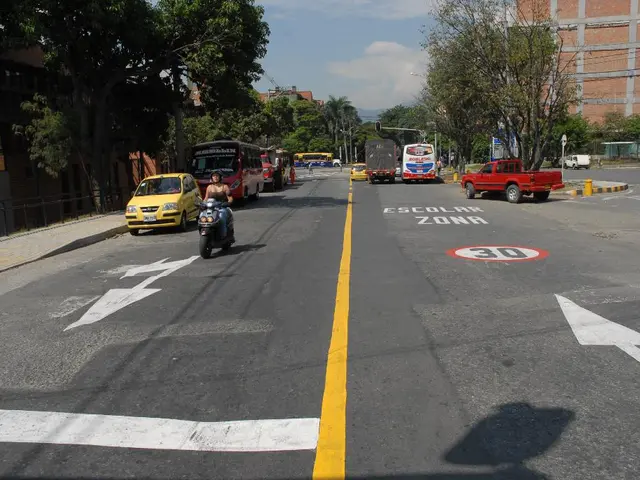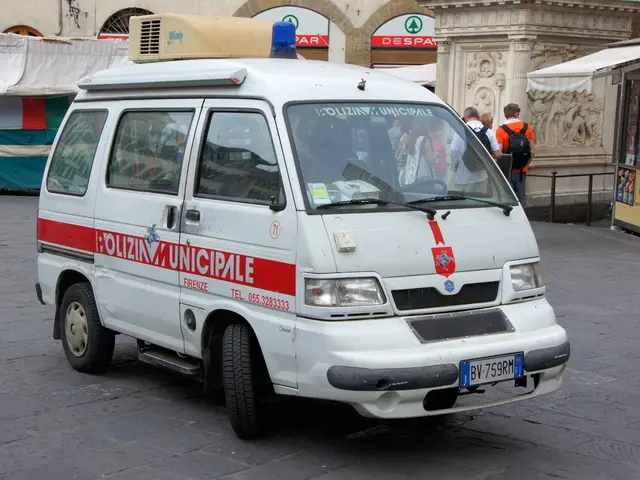Bomb Shelters Demolished in India: Residences of Two Suspected Terrorists Destroyed
In an alarming turn of events, two houses suspected of being inhabited by individuals linked to the horrific terror attack in Jammu and Kashmir, India recently experienced explosions. According to reliable sources from the news agency PTI, the residential buildings were reportedly being searched by security forces when explosives tucked inside unexpectedly detonated.
The purported occupants were allegedly terrorists from the notorious "Lashkar-e-Taiba" group, as per unconfirmed reports. The blasts resulted in the complete destruction of the buildings, but unfortunately, there has been no concrete information regarding casualties as of yet.
In a grim reminder of the past, on April 22, the picturesque mountains of Jammu and Kashmir witnessed a chilling terrorist attack that left 26 innocent civilians dead. As detailed by several media outlets, this was the deadliest terror incident in Kashmir since the 2019 Pulwama bombing and the worst civilian targeting in over two decades. The Pakistan-based Lashkar-e-Taiba's proxy group, The Resistance Front (TRF), claimed responsibility for the heinous act[1][3].
The escalating tensions between India and Pakistan continue to be a cause for concern. Following the April 2025 terror attack, India announced the expulsion of all Pakistani citizens from its borders and closed the "Attari" checkpoint. The conflict between the nations was further fueled by allegations of Pakistan's involvement in the attack. The dire situation, reminiscent of past military confrontations, threatens unpredictable consequences and has reportedly triggered a larger escalation than in 2019[3].
As international relations remain volatile, experts warn of the potential for another war between India and Pakistan[2]. The deterioration of relations between the two nations was not unexpected, as tensions have been brewing since India revoked Kashmir's autonomy in 2019[3][4]. Furthermore, Pakistan's military posture has become increasingly aggressive, with their Army Chief, Gen. Asim Munir, declaring Kashmir Pakistan's "jugular vein," while Islamabad threatens to suspend the Simla Agreement that established the Line of Control[3].
Time and again, Pakistan has utilized militant attacks as a political tool during crises, as exemplified by the 1999 Kargil conflict[1][3]. The unfortunate coincidence of the recent attack with the visit of US Vice President JD Vance to India eerily mirrors past patterns of high-profile, violent attacks during major diplomatic engagements[1].
While the tragic events of April 2025 are a grim reminder of the ongoing conflict, it is equally important to look back at significant attacks in recent history. Since 2001, terror attacks in India have claimed numerous lives, including the 2008 Mumbai attacks that left 166 people dead[2][3]. These tragedies repeatedly underscore the urgency to address the issues at hand and find a peaceful resolution to the challenging India-Pakistan conflict.
[1] - https://www.ndtv.com/india-news/jammu-kashmir-toll-in-baisaran-valley-terror-attack-rises-to-26-2974172[2] - https://www.nytimes.com/2022/02/01/world/asia/india-pakistan-relations.html[3] - https://www.reuters.com/world/asia-pacific/india-pakistan-tensions-surge-over-kashmir-peace-talks-stall-2021-10-07/[4] - https://www.hindustantimes.com/india-news/reasi-attack-11-months-on-what-has-the-govt-achieved-in-its-all-out-offensive-against-terrorism/story-oJrIxTGpZihPVZzsmjXK6N.html
- The terrorists, suspected to be from the Lashkar-e-Taiba group, are under investigation for their potential involvement in the earlier instances of explosions in Jammu, India.
- The recent explosions in Jammu residences mirror the war-and-conflicts that Jammu and Kashmir has been enduring, with terrorists like the ones from the Taiba group playing a significant role.
- The politics between India and Pakistan continue to be strained, as crime-and-justice issues, such as terror attacks by groups like the Lashkar-e-Taiba, fuel escalating tensions.
- In the general news, experts have been warning about the potential for more conflict between India and Pakistan, given the tense relations that have been brewing since 2019 and the recent string of terror attacks, such as the one in the Baisaran valley of Jammu and Kashmir.
- Political crises in the past, like the 1999 Kargil conflict, have shown that Pakistan tends to utilize militant attacks as a tool, as recently demonstrated by the alleged involvement of the Lashkar-e-Taiba in the tense situations between the two nations.







